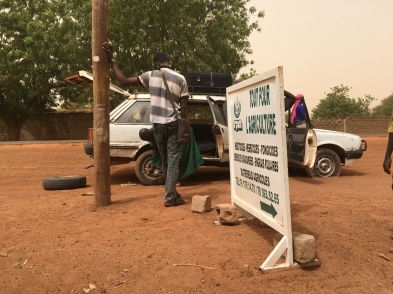
Hello all and greetings from Dakar! I am here for a long weekend to play some frisbee, eat some vegetarian food, and appreciate the beautiful temperate weather before heading back out to my final village. Earlier this week, I finished up my third field site, Ndouloumadji Dembé, where I had been working since the end of March. I headed out of Bakel in a sept place and five hours, three flat tires, and one extremely friendly Mauritanian lady in the seat next to me later, I arrived in Ourossogui (a transit hub for the region of Matam). As previously warned, the highway was absolutely horrendous and I was very glad to conclude the journey. From the garage in Ourossogui (garage being the Senegalese equivalent of a bus station or transit center), I then headed about 25 km north directly to Ndouloumadji Dembé.
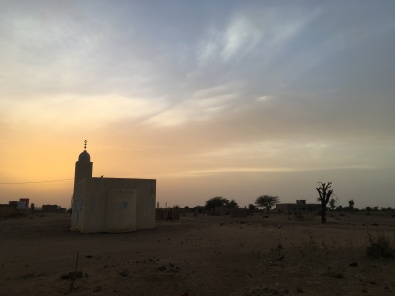
Ndouloumadji Dembé is a village of approximately 8000 inhabitants who are almost all Peuls, as is the case throughout the region of Matam, much of which is an area traditionally known as the Fouta. Luckily, this means I was able to retain the name Kadia and use my rudimentary Pulaar (the subject of either immense excitement and mirth as I fumbled through basic greetings or of long overtures about why I should be devoting several hours per day to studying the language). Ndouloumadji Dembé’s migrant association is well-organized and the village is home to many boutiques, small businesses, and even a preschool, making it a well-developed locality by regional standards. The village sits right next to its neighbor, Ndouloumadji Founébé, which I didn’t see much of, as I ended up confining my work to the Dembé side. The two Ndouloumadjis share schools, a water system, and the brand-new paved road complete with speed bumps, streetlights, and lane markers connecting the two villages to the highway. This road is courtesy of Senegal’s president, Macky Sall, whose father is originally from Ndouloumadji (a trivia fact I was not aware of before arriving).
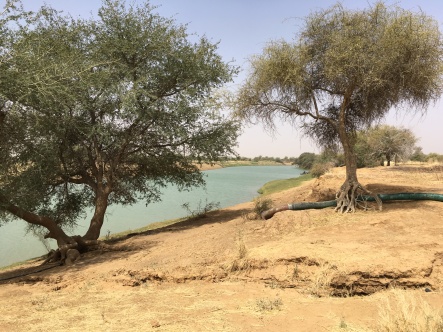
Macky is extremely popular there thanks to his familial origins, the afore-mentioned paved road, and several agricultural development projects he’s funded in the area. This support manifested itself in people’s responses to my interview questions about the Senegalese state, as well as by the popular fabric emblazoned with an image of his face and the phrase “Macky 2019” that I saw tailored into a variety of garments. It was fascinating to listen to these positive responses to Macky’s presidency, as they vary sharply with the sense of abandonment by the central government felt by most people I encountered in the greater Bakel area.
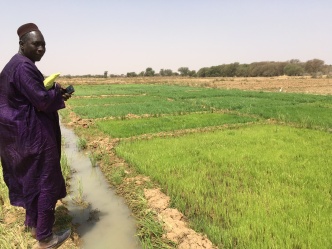
During my time in Ndouloumadji, I stayed with the deputy mayor of the commune and his family, who were nothing but kind, generous, and welcoming during my time in their home. For those not versed in Senegalese administration, a commune is the smallest unit of elected government and regroups multiple villages within it. Thus the mayor of a commune is the mayor not only of his own village, but also of many surrounding municipalities. Over the past several decades, Senegal has worked to decentralize its state, which means that some responsibilities that were formerly delegated from afar in Dakar are now carried out at the departmental or communal level.
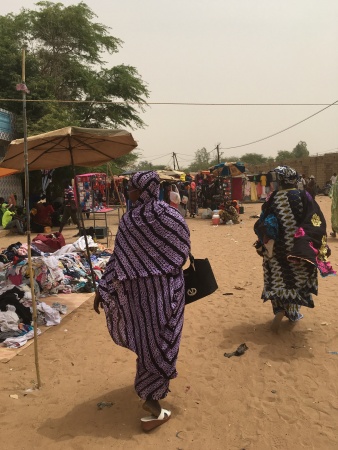
This decentralization process is not something that people living in countries with a well-developed bureaucracy might consider as a necessary reform. However, it’s a really important policy because it allows local politicians to better address regional concerns and satisfy their constituents’ needs and interests themselves, reinforcing democracy and making governing more efficient. At the same time, decentralization brings its own set of challenges. Although local elected officials are usually important and respected leaders in their communities, they might not be literate in French or have the knowledge of how to run an administration. The actual mayor of this commune is an international businessman who travels frequently for work, so my host has become the de facto mayor. For a political science nerd like myself, it was fascinating to watch the steady stream of people in and out of his house looking for his signature or guidance on paperwork ranging from birth certificates to land-usage permits.
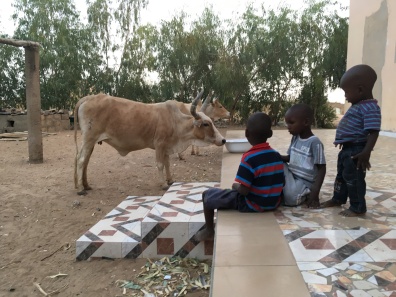
The family’s three-story house was probably the fanciest that I’ve stayed in since leaving Dakar. It was built in a more Western style with a single building housing one nuclear family, as opposed to the compound-style that is most commonly found out here. Despite the fact that the house was constructed with the typical concrete, the entire middle section on each floor was open to the elements, allowing air to circulate and keeping inside temperatures down. There was also a ring of eucalyptus trees planted around the perimeter of the yard to combat the heat and serve as a natural barrier to the elements. The family’s relative affluence was also seen through luxuries like tile floors, water taps inside the bathrooms, their three enormous cattle, and the size of their fields. I visited these fields several times and was struck by their magnitude. I was also extremely impressed by the family’s usage of a complex canal system to irrigate their crops with water pumped up from the nearby river.
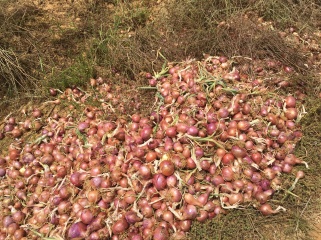
During my stay, they were in the middle of cultivating rice and harvesting onions. I’ve visited many fields throughout my fieldwork, but this visit was my first experience seeing a rice field up close (see the image up top). Rice is one of the most significant staples of a Senegalese diet, but a lot of rice eaten here is imported from elsewhere. The state is working to incentivize rice production in the Senegal River Valley and to valorize its consumption. Despite the fact that I hail from an agricultural region in the United States, living out here has highlighted my lack of agricultural knowledge and I have greatly enjoyed learning more.
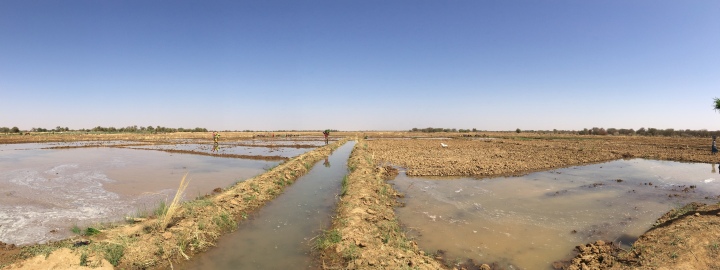
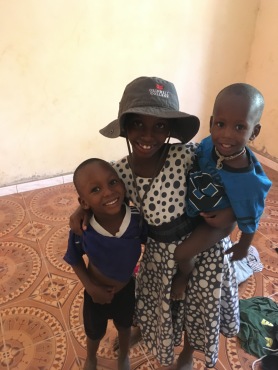
As has been the case at each of my sites, the kids of the household were very shy around me at first, but I eventually won them over with lots of tickling, handshakes, and playing silly games. The same cannot be said of the toddler living next door who resolutely refused to come anywhere near me during the entire time I was there, tried to hide when I attempted to greet her, and would usually scream in terror if I appeared too suddenly around a corner. Other funny responses to my presence include a grandmother asking me in utter seriousness with “Oh there’s a ton of people from Ndouloumadji in America, do you know them?” (I later found out she thought America was a city) or the older man miming for several minutes exactly how he would jump inside my suitcase in order to come back to the US with me. There’s also been quite a few requests for me to “let Donald Trump know” that he should allow Senegalese migrants into the country and stop trying to deport them.
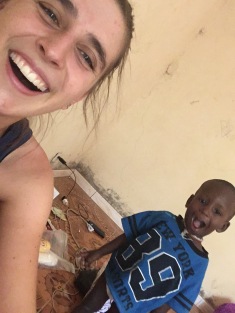
It was very interesting for me to observe the gender dynamics in this particular family, because there was only one adult woman in the household. As I’ve mentioned in previous blog posts, gender roles out here are pretty rigid, which means that women do virtually all of the domestic work of cooking, cleaning, laundry, and child-care. In this case, this division of labor resulted in one fairly pregnant person was pretty much solely responsible for feeding and cleaning up after other 15 people. For someone like myself who grew up in a household with two working feminist parents who share domestic responsibilities equally, living in rural Senegal has sometimes been shocking. I’ve tried to remain respectful of Senegalese traditions and culture, but have also engaged in several interesting discussions about gender roles, religion, and other social issues when I’ve felt the other person would be open to such a conversation. It appears that mindsets are starting to evolve, particularly among more educated people, but that social stigma against subverting gender norms remains a huge barrier to a societal change. However, as more schools are built and primary education in Senegal becomes pretty universal for all children, I am curious to see how gender roles will change over the next decade.
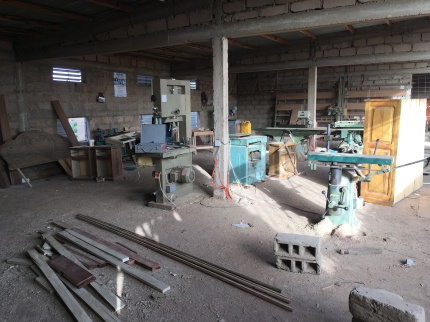
Other highlights of my time in Ndouloumadji included visiting the weekly market in neighboring Nabadji Civol (the communal seat), celebrating Senegalese Independence Day on April 4th by attending a flag raising ceremony and lunch with the region’s sous-préfet (a regional politician), taking my first ride on a horse-drawn charrette (a flat, platform-style cart used for carrying goods and people), meeting a relatively famous marabout from the Tidjiane brotherhood, and visiting the village’s carpentry professional training center (migrant-funded, of course).
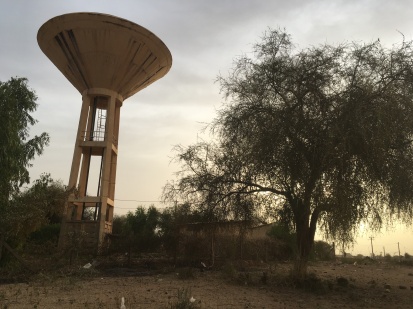
Hot season is now in full swing and the temperatures are maxing out somewhere between 100-110F each day. As usual, people were in awe seeing a toubab strolling around their village and even more surprised seeing one in these sorts of conditions. I wouldn’t say I love the weather, but as long as you move slowly during the middle of the day and drink lots of water, it’s not too horrendous. However, the temperature here in Dakar now feels unbelievably refreshing and cool (it’s currently a balmy 70F this evening). I’m going to stick around here for a few days to play in the tournament and recharge before journeying back out to Matam to my final village. I’ve been having a great experience doing fieldwork thus so far and am learning so much, but am also looking forward to being on the homestretch of my time out there.
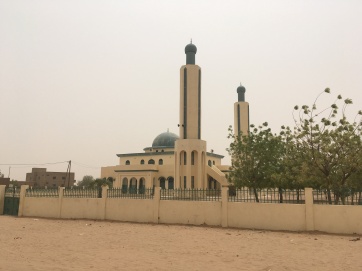
In non-Senegal news, I have recently found out that I’m going to be an English teaching assistant in French Guiana (one of France’s overseas departments) next year as a part of the French Ministry of Education’s TAPIF. I don’t know exactly where I’ll be placed yet, but I’ll be working at the secondary level, which could mean a middle school, a high school, or both. I’m really looking forward to this new adventure and a chance to speak some French while living in/near the Amazon rainforest, especially after nine months in an arid place like Senegal.
I also wanted to share this article about my kick-ass mom, because more people should know about the awesome work she does through UW Madison’s Sea Grant Institute and how unbelievable it is that Trump wants to cut programs like hers who do so much good for their recipients with so little funding from the federal government.
As always thanks so much for reading and sending love everyone’s way!

Very interesting and impressive!
LikeLiked by 1 person
Dear Colleen, I found myself remembering you as a tiny baby, then as a 4-year old jumping from your upper bunk on Dibble in Seattle, then having fresh-caught salmon in a campground on the Olympic Peninsula! Who knows what triggered those memories. And there you are now on the other side of the world. You are so fortunate to be having these experiences! Thank you for being so adventurous! It’s fun to learn all about your fantastic experiences. Congratulations on getting the teaching assistantship in French Guiana. Enjoy the rest of your time in Senegal. Much love, Aunt Rhoda
LikeLike
Hi Aunt Rhoda, thanks so much for your kind comments and for reading the blog (: It’s nice to hear from you and I hope all is well with you! Love, Colleen
LikeLike
u go girl, but where’s my shoutout?
LikeLiked by 1 person
@ everyone my friend Rachel Keen is also an accomplished young professional doing her best to change the worth one grant proposal at a time, people should know about the great work that she does
LikeLike
As always, I love reading your blog and I learn so much about the details of living there. I admire you so much for your adventurous spirit!
LikeLike
Thanks so much Kathy, I’m so glad that you’ve been enjoying following along with my updates! I hope all is well with you, Mike, and the rest of the family.
LikeLike